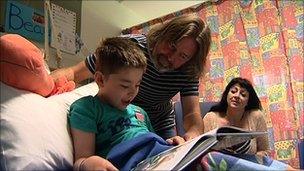Cerebral palsy boy is first to have new operation in UK
- Published

Beau Britton will now start a course of intensive physiotherapy
An operation which could help children with cerebral palsy to walk unaided has been carried out for the first time in the UK at Frenchay Hospital in Bristol.
Beau Britton, seven, from Cornwall is the first child to be funded by a local NHS trust for the procedure which aims to permanently reduce spasticity.
The micro-neurosurgery involves identifying and cutting the spinal nerves causing stiffness and pain.
Until now families had to raise the money to go to the US for the surgery.
Spinal problems
The procedure being offered by Frenchay Hospital is a new and less invasive version of selective dorsal rhizotomy (SDR) which concentrates on the lower part of the spinal cord.
Consultant neurosurgeon Kristian Aquilina, who carried out the five-hour operation earlier this month, said the refined micro-neurosurgery reduced the risk of spinal problems in later life.
He said it would also allow a quicker recovery so the long-term intensive physiotherapy which the children have to undertake can start sooner after surgery.
It should also remove future need for orthopaedic surgery and other treatments so would be ultimately cost-effective.
Mr Aquilina said: "Up to now SDR, in its traditional form only, has been available at one hospital in the country and this year alone 40 families from the UK have gone to the United States for SDR at their own expense.
"We have now set up a multi-disciplinary team at Frenchay Hospital to evaluate and select children for SDR."
The National Institute for Health and Clinical Excellence (Nice) recently updated its guidance on SDR.
A Nice spokesman said: "The latest evidence and expert opinion suggests that treatment can improve spasticity in the longer term."
The decision to fund the £24,000 operation and aftercare is made by each patient's local primary care trust.
'Take for granted'
Frenchay plans to operate on nine more patients with this particular type of cerebral palsy during the coming year.
Beau's mother Tracy Britton, from Kelly Bray, said: "Our ultimate hope is for Beau to walk without his wheelchair or walking frame and also that he will have more of the freedom and independence which other children might take for granted.
"As far as we can tell he is not waking up with cramps at night due to spasticity any more - something which has caused major sleep deprivation for all of us over the last seven years.
"Also his cerebral palsy meant that his legs were crossed and his feet were planted on top of each other. They are now straight and getting him dressed is so much easier because his overall balance has improved so much.
"He was sitting on the sofa the other day and started dangling his legs over the edge - this may sound like a really small thing but he has never been able to do this before. He can also wiggle his toes."
26 May 2011: This story was updated following further information supplied by the National Institute for Health and Clinical Excellence.
Beau's story will be featured as part of an Inside Out West documentary on SDR which will be shown on BBC One in the West at 1930 BST on Monday 20 June.
- Published25 May 2011
- Published4 May 2011